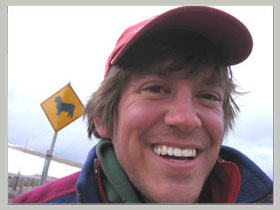
The Bill Lane Center for the American West, Stanford University

2006 Winner of the Risser Prize for Western Environmental Journalism
Matt Jenkins
High Country News

High Country News

Teams from two other newspapers were recognized with special citations. Robert McClure and Lisa Stiffler of the Seattle Post-Intelligencer were cited for their series,
"A License to Kill," which disclosed deals the federal government was making with timber companies and developers that allowed the killing and harming of endangered species. And Jim Erickson, Judy DeHaas and Michael Hall of the Rocky Mountain News were cited for their occasional series,"A Change in the Air," which reported the impact of climate change in the high altitudes of the Colorado Rockies.
The award and citations were announced by James Bettinger, director of the John S. Knight Fellowships for Professional Journalists. The Knight Fellowships program and the Bill Lane Center for the American West co-sponsor the award.
Jenkins' story described the efforts of Southern Nevada Water Authority to gain concessions that would allow Las Vegas to significantly stretch its water resources. Subsequent to the story, the negotiating parties reached an agreement that gave the city those concessions; Las Vegas continues to seek federal and state approval for a major new groundwater-pumping project in the Great Basin. The judges had high praise for Jenkins' story, describing it as a "beautiful, well-written piece about one of the last frontiers of the West...It took a complex subject and made it readable."
Jenkins will be invited to Stanford later in the year to participate in a symposium on the issues raised in his story.
High Country News, based in Paonia, Colorado, is a bi-weekly newspaper that covers natural resources, public lands, and changing communities in the 11 Western states. At the time he wrote the story, Jenkins was associate editor. He is currently West Coast correspondent, based in Grants Pass, Oregon.
The judges also praised the Post-Intelligencer and Rocky Mountain News series. One judge said of the Post-Intelligencer series, "it was a major commitment, artfully and persuasively executed, in my judgment, on a topic that is absolutely essential to the environment in the West - development." Another judge said of the Rocky Mountain News project, "they took on a broad topic of extreme importance to the western states and wrote about the science clearly and in a very balanced way."
The prize is given in the name of James V. Risser, a two-time Pulitzer Prize winner and director emeritus of the Knight Fellowships program.
Judges of the contest were Tom Brokaw, retired anchor and managing editor, NBC Nightly News; Jerry Ceppos, retired vice president/news, Knight Ridder; Jim Detjen, Knight Chair in Environmental Journalism, Michigan State University; Rosamond Naylor, senior fellow, Center for Environmental Science and Policy, Freeman Spogli Institute for International Studies, Stanford University; and Rick Rodriguez, executive editor, Sacramento Bee.
The Risser Prize was established in 2005 and is open to print, broadcast and online journalists writing about environmental issues in western regions of Canada, Mexico and the United States. The prize was established in recognition of Risser's outstanding journalism career and his leadership of the John S. Knight Fellowships for Professional Journalists from 1985 until his retirement in 2000. Risser is a former Washington bureau chief of the Des Moines Register, and he wrote frequently and incisively about environmental issues. He has had a particular interest in those issues as they affected the western United States.
In judging the awards, preference is given to stories about environmental issues that are distinctively Western. The judges placed a premium on stories that explained complicated situations, stories that exposed undiscovered or covered-up problems and stories with ramifications beyond the immediate dimensions of the issue being covered.
The Knight Fellowships program annually brings 12 outstanding mid-career U.S. journalists and as many as eight from other countries to study at Stanford in a one-year program. More than 700 journalists have studied at Stanford under the program since it began in 1966. James Bettinger is director of the program. Dawn E. Garcia is deputy director.
The Bill Lane Center for the American West is dedicated to advancing scholarly and public understanding of the past, present, and future of western North America through research, teaching, and reporting about western land and life in the United States, Canada, and Mexico.
Matt Jenkins won the $3,000 prize for his story, "Squeezing Water from a Stone," which chronicled Las Vegas' efforts to increase its water supply during negotiations with the agencies that draw water from the Colorado River.
Texas Tribune, ProPublica

The Desert Sun and USA Today

CPI, InsideClimate News, The Weather Channel

The Seattle Times

The Sacramento Bee

High Country News

5280 Magazine

Seattle Post-Intelligencer

What Went Wrong?
The Seattle Times

San Antonio Express-News

The Los Angeles Times

High Country News



